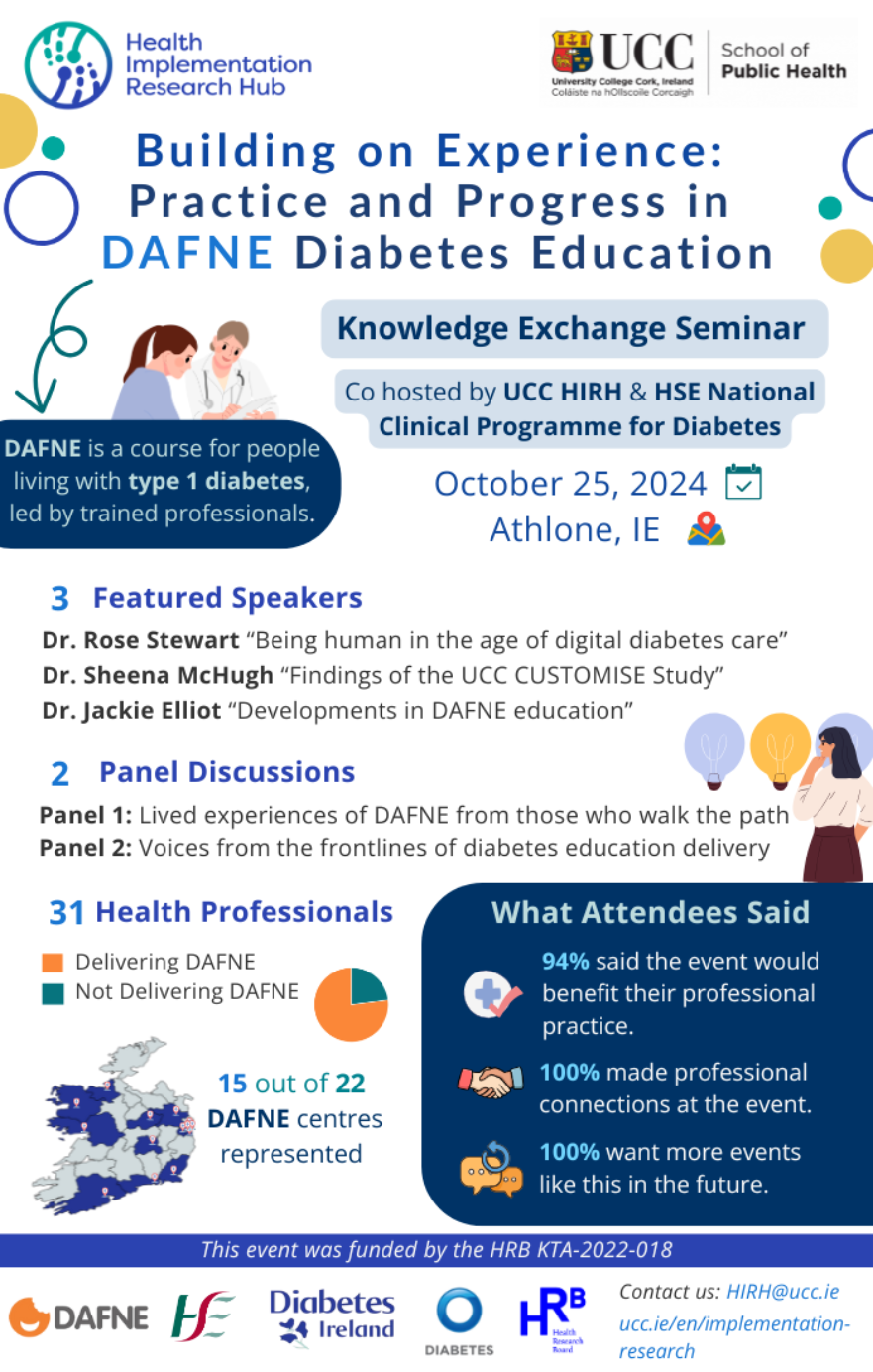Translating the tailoring process to improve the implementation of diabetes care.
This project, funded by the Health Research Board Knowledge Translation Award (HRB-KTA-2022-018), was designed to strengthen knowledge of and interest in implementation science, and to share results from the CUSTOMISE study. The CUSTOMISE study is investigating ways to support the implementation of DAFNE—a structured patient education programme for people living with type 1 diabetes. A series of knowledge translation activities were undertaken in collaboration with the HSE National Clinical Programme for Diabetes.
Knowledge Exchange Seminar
We hosted a one-day knowledge exchange seminar titled “Building on Experience: Practice and Progress in DAFNE Diabetes Education” on October 25, 2024, in Athlone, Ireland. The seminar was attended by 31 healthcare professionals from 16 DAFNE centres across Ireland, as well as researchers, policymakers, and people with diabetes. The aim of the event was to share research findings from the CUSTOMISE project, hear about the experience of those participating in or delivering DAFNE, and foster connections among knowledge users committed to improving diabetes care.
The programme featured three keynote talks and two panel discussions. Dr Rose Stewart, Consultant Clinical Psychologist with the Betsi Cadwaladr University Health Board and Adult Diabetes Psychology lead for BCUHB and NHS Wales, opened the seminar with a keynote, entitled “Being human in the age of digital diabetes”. Dr Sheena McHugh, from the School of Public Health, UCC, presented findings from the CUSTOMISE project. She presented the findings from a series of tailoring exercises undertaken with DAFNE teams to develop tailored implementation strategies. The final keynote, “Developments in DAFNE Education”, was delivered by Dr Jackie Elliott, Chair of the DAFNE UK Executive Board, who shared updates from central DAFNE management, including results from patient-reported outcome measures collected in England.
People living with type 1 diabetes who had completed the DAFNE programme (DAFNE graduates) took part in panel discussions. Their role was to share their lived experiences of the programme.
Healthcare professionals who deliver the programme (DAFNE educators) also took part in separate panels. Their aim was to share their perspectives from the frontlines of diabetes education.
Organised by Dr Sheena McHugh, Principal Investigator, and Julia Banasiak, Research Assistant, at the Health Implementation Research Hub, School of Public Health, UCC, in collaboration with the National Clinical Programme for Diabetes, the event was seen as a valuable networking opportunity. Attendees shared feedback through post-event surveys, helping us understand the impact of the seminar and gather insights from the DAFNE community.
Implementation Science Animations
The second part of the project involved developing animated resources to promote understanding of implementation science and share findings from the CUSTOMISE project.
We developed animated videos introducing key concepts in implementation science, including the tailoring process. The resources are designed for health professionals, PPI groups, and researchers across disciplines.
These resources aim to make implementation science more engaging and accessible while demonstrating how co-designed solutions can support the sustainable delivery of evidence-based interventions.
Why are we doing this research?
Implementation science focuses on bridging the gap between evidence and practice. Through this project, we hope to increase awareness and understanding of implementation science and showcase how collaboration with practitioners and patients can lead to meaningful change.
What is involved?
In this project we will:
- Host a one-day knowledge exchange seminar for DAFNE teams (healthcare professionals), people with type 1 diabetes, policymakers and researchers.
- Develop animations and real-world videos explaining basic concepts around implementation science and the tailoring process.
The knowledge exchange seminar will allow attendees to learn about our current work and give everyone involved the chance to share feedback on the process. Research findings from the CUSTOMISE project and sub-studies on DAFNE will be presented, and DAFNE leads and facilitators from both new and established sites will share their implementation experiences. Those attending the seminar will share their expectations and thoughts about it by completing a survey before and after the event. The surveys will allow us to understand the impact of the event and also to hear more from the DAFNE teams.
We want the implementation video resources to both educate about implementation science and show our research findings as an example of implementation science in action. The animated video will focus on sharing information about implementation and tailoring in an accessible way. The target audience includes PPI groups, health professionals and researchers in various disciplines. Meanwhile, the real-life video will show a case study of tailoring processes completed as part of the CUSTOMISE project, including interviews and testimonials from those involved.
Knowledge Translation Award Outputs:
Event Summary
To visually summarise our October 2024 event, we’ve created an infographic capturing the programme, participation and survey feedback from attendees.

Learn more about the knowledge exchange seminar, including reflections from participants and highlights from keynote talks, by reading our news article.
Video resources
Coming soon

